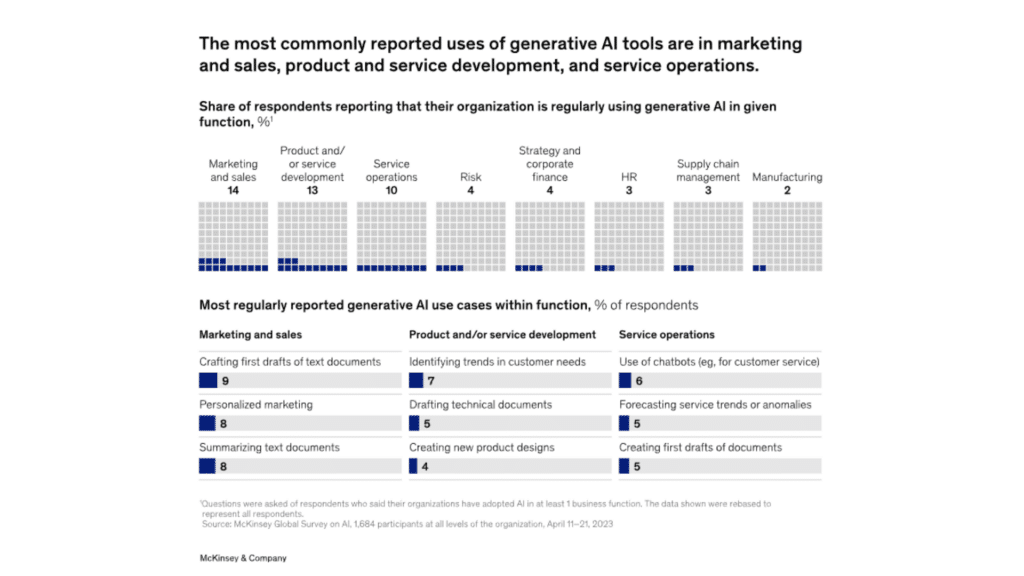“Just looking.”
That may be your company’s response to generative AI.
Everybody’s talking excitedly about it. You and your employees have played with it. You can envision major business benefits, but maybe you thought, “Not right now. This thing is still in development.”
The thing is, generative artificial intelligence (gen AI) is changing the way business is being done today. In fact, less than a year after gen AI tools were introduced to the public, 40% of the business leaders in a spring 2023 McKinsey survey* reported that their organizations would increase their investment in AI because of advances in gen AI.
Artificial intelligence vs. generative artificial intelligence: what are the differences?
It’s easy to confuse artificial intelligence with generative artificial intelligence, but there are many differences between them.
Artificial intelligence (or AI)
The definition of AI varies among institutions, but it can be described as a technology that enables computers and machines to mimic human intelligence and problem-solving capabilities. AI technology enhances business performance and productivity by automating processes or tasks that previously required human intervention. Additionally, AI allows for data use at a level beyond human capacity.
Generative artificial intelligence (or gen AI)
Forrester defines generative AI as “a set of technologies and techniques that leverage large datasets, including extensive linguistic models, to create new content (e.g., text, video, images, audio, code).” Generative AI is focused on generating new datasets, setting itself apart from traditional AI, which concentrates on specific tasks like analyzing and predicting based on existing data.
A new technology with a widespread appeal
So, your executive team may not expect to deploy gen AI soon, but your customers, investors, and employees do.
- Think of your customers. They’ll be working with competitors using gen AI to help them get answers quickly and simplify problem-solving. “Why don’t you offer me this capability?” they’ll ask.
- Consider your investors. They expect you to grow revenues and reduce costs over the long term. “Why aren’t you using gen AI to do that?”
- Listen to your employees. Like the general public, they have easy access to ChatGPT and other gen AI models. They’ve seen how gen AI can streamline their work. “Why is the company not helping make my job easier so I can do higher value, more engaging tasks?”
Given these expectations, it’s valuable to get a quick overview of what gen AI can do for you, and the next steps you should consider.
Increasing generative AI integration into multiple business functions
Your customer relationships are your lifeline. While customer service is essential to many businesses, its operational costs are often high because your representatives need to process a large number of cases, big and small.

So it’s not surprising that organizations seeking to add greater value use gen AI in their service operations. According to the 2023 McKinsey survey, service operations, marketing and sales, and product and service development are among the most commonly reported business functions using gen AI tools. Here’s why.
Faster, better service
Gen AI’s conversational flexibility benefits you in a big way. Because it’s significantly superior to a run-of-the-mill chatbot’s pre-programmed replies, gen AI can automate responses to a great number of simpler customer queries and free up your customer care team for more complex cases.
As a result, your support team is able to focus on delivering greater value to your customers while, allowing you to accelerate the delivery and volume of service overall.
More personalized customer experiences
Moreover, gen AI can help you create more personalized experiences for your customers. By processing vast amounts of your customer data, gen AI can surface customer goals and other insights and add these to the customer profile.
Your team can then use this information to personalize their interactions with your customers and thus enhance customer loyalty, engagement, and value.
More efficient marketing
Gen AI will streamline all your marketing team’s work. Whenever your team needs to create custom text, images, and video for customers, or develop ads, emails, and other communications campaigns, gen AI can deliver a wealth of ideas and content in different styles and formats.
Taking advantage of your customer insights, you’ll be able to create hyper-personalized emails and other targeted communications as well as inspire your product team to develop specific solutions for specific customers.
Thus, gen AI will multiply the efficiencies and scale of your marketing team’s efforts to drive more business and enhance customer loyalty, engagement, and value.
Significant operational benefits for companies
Accelerate product development
Product and service innovation is one of the pillars of your business’ sustainability. But often, brainstorming new concepts is challenging and time-consuming. Using gen AI, you can quickly harvest a high number of unconventional ideas that can stimulate your team to explore new paths of discovery.
Furthermore, you can harness gen AI to design product prototypes and propel them through various scenarios to test their viability.
For example, using gen AI, car designers can vary the look, materials, and construction of car models and test them virtually, crashing them into walls and speeding them through wind tunnels. The resulting data leads to faster decisions, on a wider variety of designs, while saving you time and money.
Reduce your business risk every day
Managing the overall risk of your business is a daily priority. Whether it’s cybersecurity, regulatory and compliance issues, credit and financial risk, or operational miscues (to name only a few potential vulnerabilities), gen AI can help you react quickly and proactively.
Take for instance customer credit risk. Gen AI can monitor, both in real time and contextually, identity verification, credit rating, credit card data, and other relevant financial data. Not only can gen AI be programmed to highlight issues, but it can also analyze the data, set responses in motion, and predict future patterns of activity.
Similarly, in cybersecurity, gen AI works in real time to review your network data, check on hardware and software connections, detect unusual patterns of activity, deliver its analysis, and respond as programmed.
With your risk proactively monitored and responded to by gen AI, you gain more peace of mind in your decision-making.
Increase your operational efficiency
Time-intensive, repetitive, low-value tasks are at the foundation of many business processes. Gen AI can streamline many of them. Consider these examples:
- Your technicians in the field. They may need to refer to thousands of pages of technical guidance, procedures, and relevant customer documents to do their work. Instead of searching manually and digitally for this information, your technicians can query gen AI with a few prompts to quickly retrieve the information needed.
- Software programmers. Their skill set is a scarce commodity, so ideally, you want them working on the more complex aspects of their job. Gen AI acts as a gifted assistant that can generate and deploy code to the various applications you run on different platforms. This work frees up your programmers to validate this gen AI code and do higher-value work.
- Knowledge workers. Regularly, they produce reports, summaries of content, email, and other communications. Gen AI can streamline these tasks by doing the heavy lifting of analyzing content and creating drafts in different styles and formats. Employees can then edit the resulting product and save hours daily, which they can dedicate to greater productivity.
Cloud migration boosts the use and
benefits of generative AI
Like any valuable tool, gen AI delivers great benefits and carries risks. We’ve all read the stories about gen AI’s “hallucinations” (invented information), errors of fact, data leakage, copyright violations, biases, and so on.
It’s useful to remember that gen AI is a quickly evolving technology and these issues will be addressed. As a leader striving to protect your company from risk, you also don’t want excessive caution to keep your business on the sidelines, while other players benefit enormously.
‘’However, while companies are rushing to adapt and implement generative AI, they must bear in mind that there will be great future benefits from AI with cloud-based IT infrastructures.’’
André Girard, Director of the AWS Center of Excellence at Cofomo
Remember, though, that to take advantage of all the benefits gen AI offers, some of your IT infrastructure needs to operate in the cloud. Only with a cloud operating model can you tap into the next-level technologies that will enable you to transform the business.
If migrating to the cloud gives you pause, then read our upcoming article, which will present the reasons why cloud migration can help your business thrive.
*References:
https://www.mckinsey.com/capabilities/quantumblack/our-insights/the-state-of-ai-in-2023-generative-ais-breakout-year
https://www.forrester.com/blogs/category/generative-ai/





